Analysis
The ‘Russia connection’ that unites the European right
The sovereignists, whether in Hungary, France, the UK, Italy or elsewhere, seem to always side with Putin on every issue, as much as they seem to love Trump.

It’s not the rejection of immigration, the defense of a notion of national identity or the impulse to say no to the dictates from Brussels. If there’s something Europe’s new right-wing parties have in common, it’s not their slogans or electoral programs, but rather their geopolitical stance. What truly unites the “sovereignist front” is the figure—or, if you prefer, the long shadow—of Vladimir Putin.
A dense network of relationships, international travel, meetings and political—and sometimes also economic—exchanges ties together the wide variety of the new black shirts with the strongman in the Kremlin.
On the day of the launch of a “sovereignist manifesto” meant to join together political forces belonging to different groups in the European Parliament, the French daily Libération—which dedicated its cover to Salvini and his strategy, calling him “the new Le Pen,” the only one who could be able to pull together the nationalist-populist movements—also pointed out the proximity of these political forces to Moscow’s politics and power. On the other side of the Alps, the liberal daily Le Monde published an in-depth investigation with the title “Vladimir Putin, sponsor (parrain) of the European extreme right.”
It’s easy to understand why there would be quite a bit of worry in Paris about the international support for Marine Le Pen, an always-reliable ally of the Lega, who is contending directly with Macron in the campaign for the European elections. However, the same issue directly involves most of the similar political formations in the running for the European elections across the continent.
Thus, while the Germans of the Alternative für Deutschland only signed an agreement to ally with Salvini—and thus also with Le Pen—on Monday, the media had already been reporting their and their new alliance partners’ closeness to the Kremlin for some time. In recent days, for example, the BBC has published the results of an investigation on AfD deputy Markus Frohnmaier, who is being accused of having asked the Russians for help in his election campaign two years ago, promising in return, according to leaked documents, that he would “immediately start operating in the foreign policy field” to the advantage of Moscow.
Furthermore, just ahead of the 2017 general elections, Frauke Petri, the then-leader of the AfD—who later left the party, denouncing its growing “extremism”—was invited to the Russian capital by the Chairman of the State Duma, Vyacheslav Volodin, a leading figure in Putin’s United Russia party. Marine Le Pen got an even better welcome, as she was received at the Kremlin by Putin himself in March 2017, only a month before the French presidential elections. The friendliness, even on a personal level, between the Russian president and the leading figures of the extreme right is shown by the fact that he was the “guest of honor” last summer at the wedding of the Austrian Minister of Foreign Affairs, Karin Kneissl, a member of the liberal-nationalist FPOe, the heirs of Jörg Haider, who have had close ties with the Lega Nord for decades.
As concerns the Lega, in addition to the meeting between Salvini and Putin which took place in Moscow in 2014—in which, as Salvini wrote on social media, they “talked about immigration, peace, Italian companies, shared values, another possible Europe”—it is enough to recall the “cooperation and collaboration agreement” signed in 2017 between the Lega Nord and United Russia. This agreement was signed in Moscow by Salvini and Sergey Zheleznyak, one of the top leaders in Putin’s party responsible for international relations. Afterwards, the current Italian vice-prime minister made several other trips to Moscow.
The sovereignists, whether in Hungary, France, the UK, Italy or elsewhere, seem to always side with Putin on every issue, as much as they seem to love Trump—positions they share with the true hardliners of the extreme right. Furthermore, the support on Putin’s side is mutual.
This “Russian connection”—a term coined by Péter Kreko, a researcher at the Political Capital Institute in Budapest, to describe this suspicious interweaving of relationships—seems to work on two distinct levels. The first is the political, public level: for instance, Aleksandr Dugin, one of Putin’s ideologues, published a letter of support that he sent to Nikos Michaloliakos, the head of the Greek neo-Nazi Golden Dawn party, arrested after the murder of rapper Pavlos Fyssas. The second level is a “dark” one, out of public view, connected to possible financial or “technical” help being offered by the Kremlin to nationalist parties and movements.
This second, “dark” level of support from Moscow is something that Giovanni Tizian and Stefano Vergine talk about in their Il Libro Nero della Lega (“The Black Book of the League”), recently published by Laterza, which mentions a possible loan of three million euros made to the Lega by the Kremlin in connection with the upcoming European elections. The Lega Nord has explicitly denied all such allegations.
Originally published at https://ilmanifesto.it/la-russia-connection-che-unisce-la-nuova-destra/ on 2019-04-09
